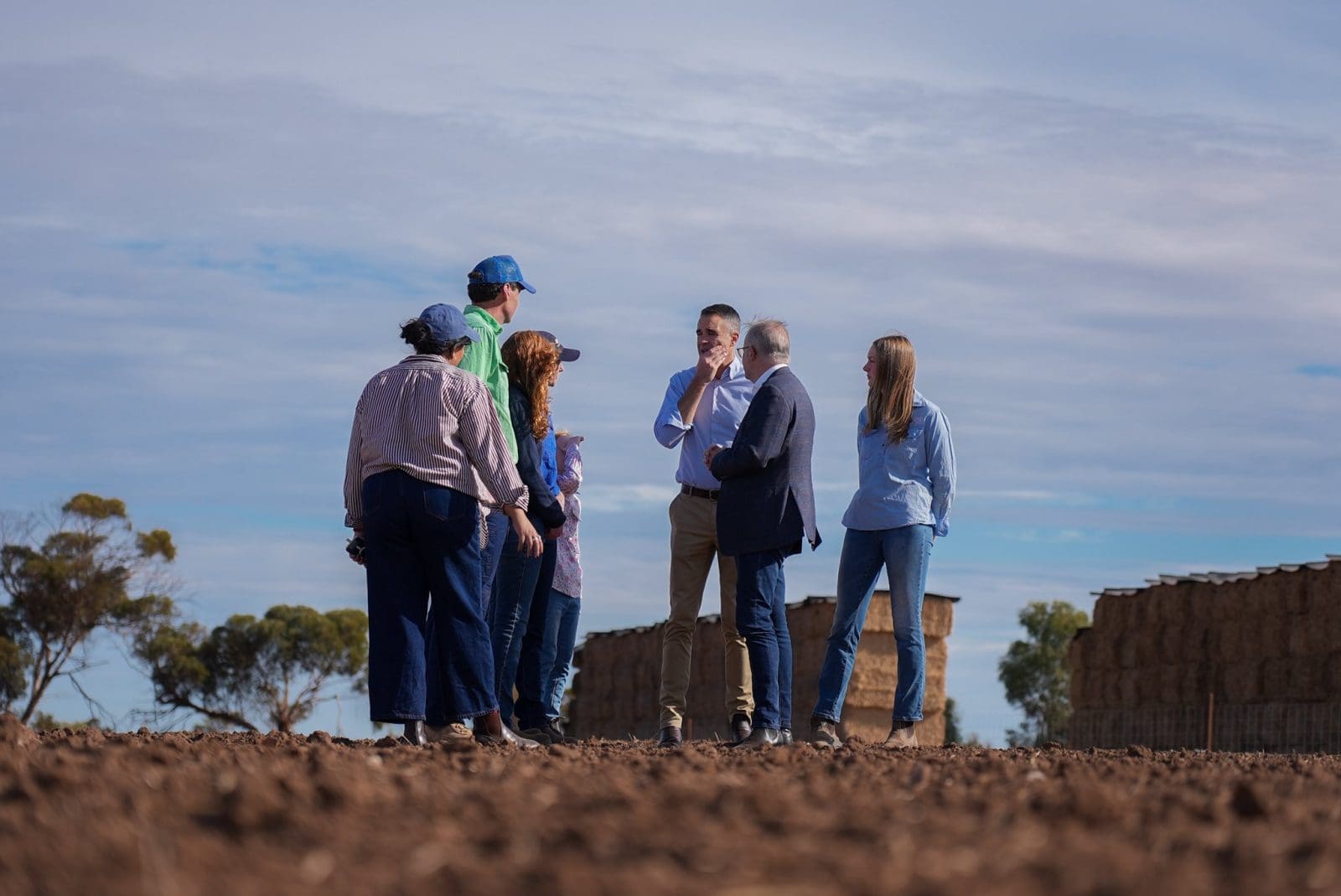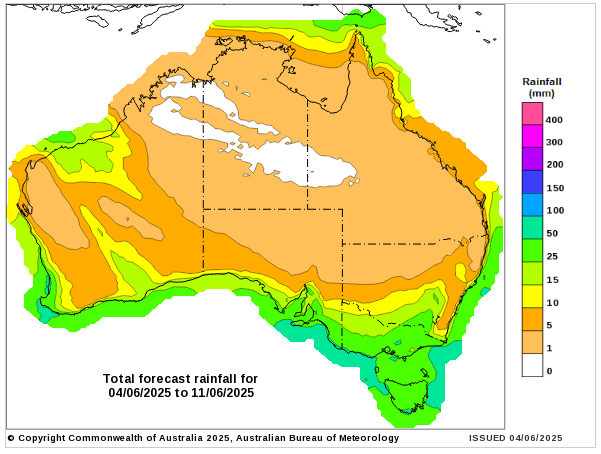
SA Premier Peter Malinauskas and Prime Minister Anthony Albanese visited the Fischer family’s farm at Wasleys on Monday to see for themselves the impact of drought. Photo: Peter Malinauskas
FORECASTS point to the anxious wait for rain to germinate dry-sown crops in South Australia and Victoria, and parts of southern New South Wales, may be over in coming days.
If so, it will get cereals and pulses started in the preferred window, and canola off to a late but reasonable start.
SA growers have their fingers crossed for the 10-50mm predicted by the Bureau of Meteorology and others, and also for some assistance from the SA Government via its Budget which will be handed down tomorrow.
Following Monday’s visit to a farm by Prime Minister Anthony Albanese, Federal Agriculture Minister Julie Collins, SA Premier Peter Malinauskas and SA Primary Industries Minister Clare Scriven, farm lobby groups have every reason to believe the enormity of the drought is understood by both levels of government.
At the top of their requests are access to low or no-interest loans, changes to Farm Household Allowance eligibility, and subsidies to support the transport of fodder and livestock as the shortage of roughage in SA, Vic, and NSW becomes chronic.

Today’s forecast points to at least 10mm of rain for those graingrowing regions of Australia that need it to get the winter crop up and away. Image: BoM
Relief needed now: GPSA
Grain Producers SA welcomed Mr Albanese’s visit to the Fischer family’s farm on the Adelaide Plains as a sign the Federal Government acknowledged and understood the severe impact of SA’s worst drought in living memory, but warned immediate support must follow.
During the visit, a further $2 million was announced as being available to the Rural Financial Counselling Service (RFCS), and that the biennial National Drought Forum will be held in Gawler in August.
GPSA chief executive officer Brad Perry said while additional funding contingency for RFCS is important as demand continues to rise, immediate financial support for farmers needs to follow the visit, addressing the scale and urgency of the drought gripping the state.
“While the measures announced today are welcome, the reality on the ground for South Australian grain producers is that we need significantly more immediate and practical support,” Mr Perry said.
“GPSA successfully advocated for the Federal Agriculture Minister to visit South Australia last week, where we hosted her on a farm tour and took part in an industry roundtable to present practical support options on behalf of grain producers.
“The Prime Minister’s visit is a strong signal that the Federal Government recognises the severity of the challenges facing South Australia’s grain sector — but that recognition must now be matched with immediate, on-the-ground support for impacted farming families.
“Many farmers are experiencing severe cash flow constraints and are being forced to make incredibly difficult decisions about their future.”
“Boosting financial counselling services will help some producers navigate tough decisions and the RFCS is a critical support mechanism to help farmers through this difficult time, but without tangible financial relief such as low or no-interest loans, too many growers will be left without a viable path forward.”
“Support must include direct mechanisms that ease financial pressure, not just prepare producers for future challenges.”
Mr Pretty said GPSA was already calling for more direct support to help producers manage household and business costs, including quick and easy to access concessional or interest-free loan options, freight assistance, council-rate rebates and further mental health support.
“In the longer term, we’re also calling for a review of the outdated Farm Household Allowance asset threshold, and for a serious look at the Regional Investment Corporation’s loan settings to ensure they’re meeting the needs of the agriculture industry.”
Conditional green light for WA hay
On Saturday, the SA Government announced it would allow hay to be accessed from parts of Western Australia, with consignments to be assessed on a case-by-case basis and subject to certain conditions.
The agreement follows ongoing discussions between Livestock SA and SA’s Department of Primary Industries and Regions (PIRSA) about biosecurity restrictions that have prevented hay from WA being brought into South Australia due to the presence of green snail.
The PIRSA website has now been updated with the revised WA green snail zones revised WA green snail zones and covers the requirements for commercial hay imports.
These include biosecurity risk zones for green snail in WA and Victoria, and Red Imported Fire Ant in New South Wales and Queensland.
Livestock SA CEO Travis Tobin thanked the SA Government for working quickly with Livestock SA to address this issue and said the decision was a positive step for producers struggling to source available and affordable feed.
“We know the competition and cost of sourcing fodder is increasing by the week, so it is important that we provide producers with as many options as possible to help them keep animals fed, particularly key breeding stock,” Mr Tobin said.
“We also understand the importance of maintaining strong biosecurity, which is why experts have been involved to ensure it wasn’t compromised by opening up the low-risk areas of WA.”
Mr Tobin also said that Livestock SA was continuing its efforts to convince the government that a freight-support program is urgently needed.
“The argument that freight subsidies distort the market no longer stands as government funded activities for flood relief in Queensland and New South Wales have already had that effect.”
“Drought-impacted livestock producers in our state must be able to compete for interstate fodder on level terms.”
Livestock SA has called for a freight-support program to include:
- Subsidies for transporting stock to and from agistment; transport stock to sale or slaughter; transport fodder or water to stock on drought affected properties.
- Emergency permits made available to enable road trains on key freight routes to reduce costs;
- Vehicle registration concessions for primary producers using their own trucks and trailers.
Call for interest-free loans
Federal Nationals leader David Littleproud has called for the Albanese Government to bring back interest-free Regional Investment Corporation loans for farmers impacted by drought and floods.
Mr Littleproud said farmers across Australia have been simultaneously devastated by recent floods as well as drought.
“In 2020, the Coalition introduced a two-year interest free period for loans up to $2 million for farmers experiencing hardship during the drought,” Mr Littleproud said.
“The zero percent interest rate applied to new and existing drought loans and to refinance existing debt from a farmer’s commercial bank, to give farmers some breathing space, saving them cashflow and giving them time to restock and replant.
“It stopped a lot of farms from going bankrupt.
“It is clear recent rain and drought events are really hurting farmers, which is why I am calling on Labor to revisit this RIC loan product once again.”
Mr Littleproud has written to Ms Collins, requesting support from the agriculture minister for the thousands of farmers dealing with floods and drought.
He said current assistance did not go far enough, and farmers would get much-needed reprieve by having access to a $2M loan with an initial two-year interest-free period, then three years interest only, then five years principal and interest.
Pressure from NFF
National Farmers Federation president David Jochinke joined the PM on his farm visit on Monday, which he said provided a valuable opportunity to hear from those on the ground about the scale of the challenge and the support needed to get through it.
“The conditions have to be seen to be believed, and it means a great deal to these communities to have the PM shine a spotlight on what’s happening,” Mr Jochinke said.
“Things are really tough right now in large parts of South Australia and Victoria, as well as areas in Tasmania, NSW and Western Australia.”
Beyond Monday’s announcements, the NFF continues to call for immediate actions from the Federal Government including:
- Extending the RIC’s loan capacity past 30 June 2026;
- Responding to the independent review of the RIC; and,
- Providing additional mental health support for farmers and regional communities.
Mr Jochinke said it was important to remember the drought was not just impacting farmers, but entire communities.
“We also have to acknowledge that with this drought traversing multiple states – we need strong coordination across all levels of government to ensure support flows seamlessly to farmers.”
Source: GPSA, Livestock SA, NFF, Nationals

HAVE YOUR SAY